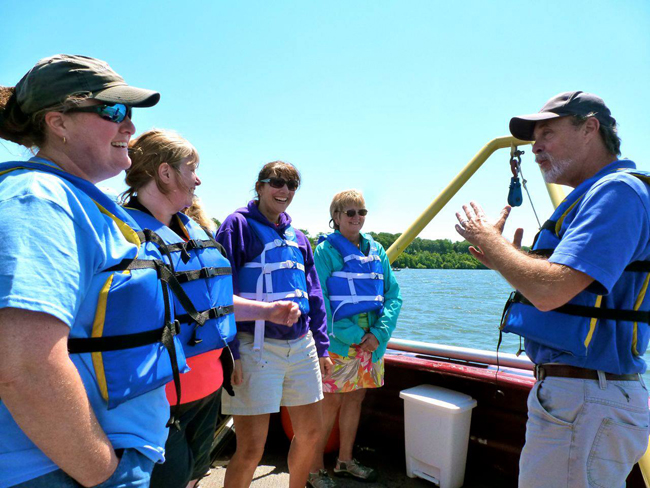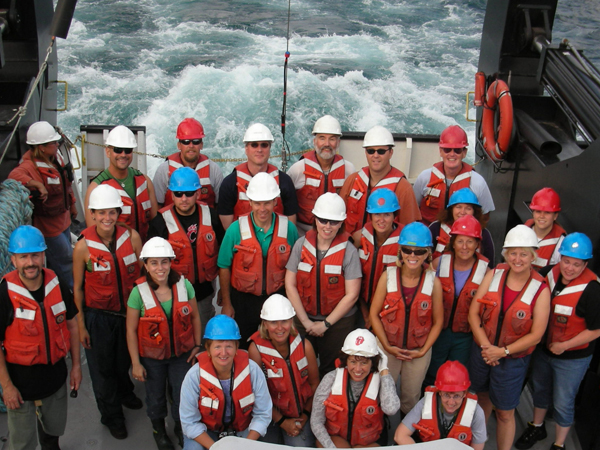Contacts:
Helen Domske, NY Sea Grant, 716-645-3610,
hmd4@cornell.edu
Paul C. Focazio, NY Sea Grant, 631-632-6910,
paul.focazio@stonybrook.edu
Publicist Kara Lynn Dunn, 315-465-7578,
karalynn@gisco.net
Buffalo, NY, June 26, 2013 - Earlier this month, Pennsylvania Sea Grant (PASG) held a three day teacher NOAA B-WET workshop with Ohio Sea Grant. During one of the MEWEs (meaningful educational watershed experiences), Maritime Education Specialist David Boughton led educators - including (pictured below, at far right) New York Sea Grant (NYSG) Coastal Education Specialist Helen Domske - in testing Lake Erie sediment aboard the
R/V Environaut. Photo courtesy of PASG.

Next month, Domske will welcome teachers in New York and several other Great Lakes states to two separate experience-through-learning tours of Lake Ontario.
First, from July 7-13, Fifteen 4th-10th grade teachers and non-formal educators selected from around the Great Lakes basin will come aboard the U. S. Environmental Protection Agency's 180-foot research vessel R/V Lake Guardian for a week-long Shipboard and Shoreline Science workshop. These annual teaching cruises take place on a different Great Lake each year, with 2013 focusing on Lake Ontario. In 2014, the Shipboard and Shoreline Science Workshop will take place on Lake Erie.
Teachers work alongside the research vessel scientists as they conduct their fieldwork, which, this year, will include areas of study such as species at the bottom of the food web, organisms living on the floor of Lake Ontario, and monitoring water quality. Their experiences will be captured in a series of posts on New York Sea Grant's blog,
www.nyseagrant.org/blog.
Domske, lead educator on the cruise, says, “This shipboard cruise is a meaningful and exciting way to energize teachers as they personally experience the interaction of the Great Lakes’ water, weather, aquatic species and other natural and manmade elements. They will collect and analyze data alongside scientists and work with colleagues to develop unique classroom teaching tools.”
Participants will combine on-deck activities with classroom development of hands-on learning activities for their students. New York Sea Grant provides post-cruise follow-up assistance to facilitate classroom implementation.
Teacher participants receive a stipend to complete a stewardship project with their students. Funding is provided through the Great Lakes Restoration Initiative and is hosted by the Center for Great Lakes Literacy and coordinated by the Great lakes Sea Grant Network and Great Lakes National Program Office.

As pictured above, it's been five years since the R/V Lake Guardian last brought a set of teachers out on Lake Ontario for a workshop like this one. And, like he did in 2008, New York Sea Grant's Web Content Manager Paul C. Focazio will again blog during this tour. Focazio will create this blog much in the same way, by shadowing the educators and writing entries about the information they learn and their reactions. “I was constantly in production mode,” he recalls from the last tour.
Why blog about the educators' experiences while aboard the R/V Lake Guardian? “We really want to make people realize that science is going on, and to teach them about the science itself,” says Domske. "I think a blog like this one can be an addendum to most educational experiences. And, I don’t think it is just limited to teacher or educational programs. This would be a great way to show people what’s going on with a restoration project, for instance.”
Two weeks after the Lake Guardian tour, another set of watershed teachers in grades 5-12 and non-formal educators in New York will engage in a land-based Great Lakes Lake Ontario-Oneida Lake Field Experiences Workshop (July 22-25). This Domske-led four-day workshop will offer educators an agenda designed to provide them with new ways of inspiring their students through meaningful watershed educational experiences.
“The goal of this workshop is to help educators develop Great Lakes literacy for their own specific teaching areas with the long view of develop citizens engaged in sustainable habitat practices,” says Domske.
Learning modules incorporate the five key criteria developed by the National Oceanic and Atmospheric Administration (NOAA). Activities focus on how to create excitement, develop learning exploration interest, explain diverse waterfront science topics, elaborate on those topics, and evaluate the success of the teaching process using the STEM: science, technology, engineering and mathematics method.
Workshop instructors include Cornell University researchers, New York State Department of Environmental Conservation (NYSDEC) and U.S. Geological Survey (USGS) biologists, and other New York Sea Grant specialists.
Venues for the workshop include SUNY Oswego, H. Lee White Marine Museum and the US Geological Survey Lake Ontario Biological Station in Oswego, NY; the Cornell University Biological Field Station on Oneida Lake in Bridgeport, NY; the NYSDEC Salmon River Fish Hatchery in Altmar, NY, and the Eastern Lake Ontario Dunes and Wetlands Area along the shoreline in Jefferson and Oswego counties.
For updates on both of these events, keep tabs on the "News/Topics' sectcion of NYSG's "Great Lakes Coastal Youth Education" resource site,
www.nyseagrant.org/cyeducation.
More Info:
New York Sea Grant (NYSG), a cooperative program of Cornell University
and the State University of New York, is one of 33 university-based
programs under the National Sea Grant College Program (NSGCP) of the
National Oceanic and Atmospheric Administration (NOAA). The NSGCP
engages this network of the nation’s top universities in conducting
scientific research, education, training and extension projects designed
to foster science-based decisions about the use and conservation of our
aquatic resources. Through its statewide network of integrated
services, NYSG has been promoting coastal vitality, environmental
sustainability, and citizen awareness about the State’s marine and Great
Lakes resources since 1971.
For updates on Sea Grant activities:
www.nyseagrant.org has RSS,
Facebook,
Twitter, and
YouTube links. NYSG also offers a free e-list sign up via
www.nyseagrant.org/coastlines for NY Coastlines, its flagship publication, and Currents, its e-newsletter supplement, each distributed several times a year.